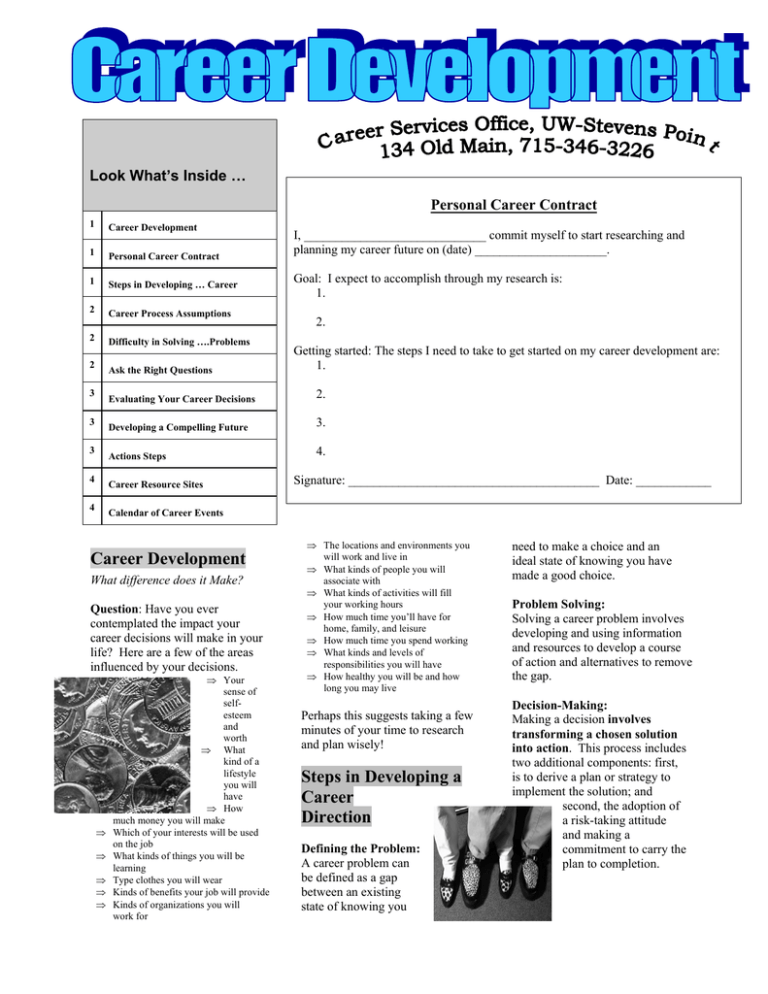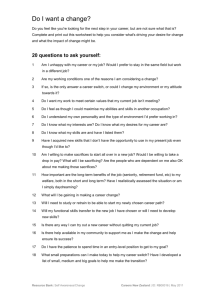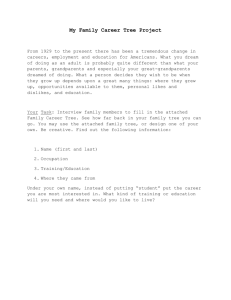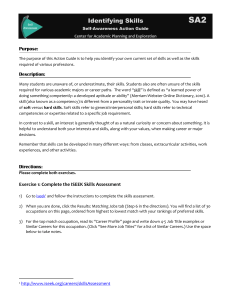Look What’s Inside … Personal Career Contract
advertisement

Look What’s Inside … Personal Career Contract 1 Career Development 1 Personal Career Contract 1 Steps in Developing … Career 2 Career Process Assumptions 2 Difficulty in Solving ….Problems 2 Ask the Right Questions 3 3 3 4 Goal: I expect to accomplish through my research is: 1. 2. Getting started: The steps I need to take to get started on my career development are: 1. Evaluating Your Career Decisions 2. Developing a Compelling Future 3. Actions Steps 4. Career Resource Sites 4 I, _____________________________ commit myself to start researching and planning my career future on (date) _____________________. Signature: ________________________________________ Date: ____________ Calendar of Career Events Career Development What difference does it Make? Question: Have you ever contemplated the impact your career decisions will make in your life? Here are a few of the areas influenced by your decisions. Your sense of selfesteem and worth What kind of a lifestyle you will have How much money you will make Which of your interests will be used on the job What kinds of things you will be learning Type clothes you will wear Kinds of benefits your job will provide Kinds of organizations you will work for The locations and environments you will work and live in What kinds of people you will associate with What kinds of activities will fill your working hours How much time you’ll have for home, family, and leisure How much time you spend working What kinds and levels of responsibilities you will have How healthy you will be and how long you may live Perhaps this suggests taking a few minutes of your time to research and plan wisely! Steps in Developing a Career Direction Defining the Problem: A career problem can be defined as a gap between an existing state of knowing you need to make a choice and an ideal state of knowing you have made a good choice. Problem Solving: Solving a career problem involves developing and using information and resources to develop a course of action and alternatives to remove the gap. Decision-Making: Making a decision involves transforming a chosen solution into action. This process includes two additional components: first, is to derive a plan or strategy to implement the solution; and second, the adoption of a risk-taking attitude and making a commitment to carry the plan to completion. Career Process Assumptions Difficulty in Solving Your Career Problem 1. You must come to an understanding of what are your roadblocks to making an effective decision. One of the major roadblocks for most people is the lack of knowledge and awareness about themselves and the world of work. Very few people have ever taken a careers course or done much research into possible careers and/or into themselves. So it will be impossible to make a good decision until you have good information to decide upon. 2. 3. 4. 5. Making career decisions requires coping with change. You need to understand your style of how you approach or avoid change and how to deal with it effectively. People generally use only 5% of their potential. You must make a decision to tap the unused potential to make and act out life decisions. You must deal with the factor of choice. There must be active personal commitment to your career development – no one will do it for you. You have the choice to change your situation or change your mindset of how you are perceiving your situation. You must organize and focus your thoughts and feelings into an action plan to effectively contribute to satisfying progress. Making career choices requires taking risks. It is unproductive to assume that career growth is a planned, predictable, and risk-free process. People often comment that they are confused on a career direction. What they are is frustrated -- they don’t have enough information to be confused. Your main goal is to gain enough information in order to be confused, then you can move on to problem solving. If you know that you have enough information and are unable to make effective decisions, you may have a different problem and you will need to seek out assistance or counseling to deal with this roadblock. Keep in mind that it is normal, and in your best interest, not to make a career decision until you have appropriate information. Other factors to consider: Career problems tend to be complex due to the many factors to consider: economy, labor market, educational and training opportunities, and family issues interacting with an individual’s personal values, interests, skills, and financial resources. 2 There are many possible solutions, each having distinct and often overlapping advantages and disadvantages. There is no guarantee that the choice of college, occupation or job will ensure success or satisfaction, yet making the best informed choice and committing your efforts will maximize chances of success. Ask the Right Questions to Get the Right Answers When you develop questions, you develop direction for your research. There are many domains in which you must ask questions. The following are some domains you must begin to question. Self Knowledge What are my values, interests, and skills? What am I looking for in an occupation or college major? What am I looking for in a job? Occupational Knowledge What kind of job can I get with my education and experience? What is a typical day for a person employed as a _________? What are the educational and training requirements for __________? What kind of employers would hire a _______? Decision-Making What are the steps in choosing an occupation or college major that will meet my needs? How do I usually make important decisions? Developing a Compelling Future One of the first steps you must take after your decision to commit to identifying and developing your career direction is to create energy and momentum. Instead of getting trapped in making a living you must design a life – develop bigger, more inspiring, more challenging goals. You must create some vision of what you want to be doing in the future. Effective life planning will include balancing your goals in the various aspects of your life: emotional, physical, intellectual, philosophical, vocational, and financial. Your goals have to be big enough to inspire you into action – to develop a passion! 1. 2. Once you set your goals, you must immediately follow up with developing a plan for massive and consistent action towards its fulfillment. Actions must be taken early in the process to direct your time, efforts, and what you notice and pay attention to. Career planning takes energy and time; it is much easier to take the path of least resistance and avoid taking responsibility for your own life. Start Early: Begin preparing for your career as soon as possible and continue throughout college. Set up a system to organize your research, ideas, and job search. Start a file system or 3 ring-notebook. Organizing your information and ideas will help in gaining clarity out of confusion, when the time comes. Set a date and time to begin your organizational system. So no matter where you are in the career planning process, we can assist you to develop a plan of action and locate the resources to assist you in developing a more successful future. Our hours are: Monday – Friday 8:00 AM to 4:30 PM Walk-in are held on Thursdays from 1:00 to 4:30.Set a date and time to visit the Career Service Office. Date: _________________ Date: _________________ Time: _________________ Time: _________________ Develop Effective Questions: You need to have purpose, a starting point, and direction. At the beginning of your file system or notebook begin a section to write down your questions and action steps you must take to answer these questions. 5. Take out a piece of paper and begin think and write questions about your future lifestyle, education, and occupation. 3. Commitment to Taking Action Steps Make a strong commitment of effort and time in developing a career direction. You need to lock yourself into spending quality time in research on a continuous basis. career library and a mini computer lab. There are hundreds of resource books on careers, academic majors, and employers. Brochures on many of our services and career topics are available. The following 12 action steps will assist in developing a better understanding of yourself, the job market, and what is the best occupational fit for you. 4. Set Priorities and Goals: Determine what is most important to you and identify realistic steps you can take to make your dreams become reality. Visit the Career Services Office: We are located at 134 Old Main. The Career Services Office is staffed with professional career/job search counselors to assist you with questions and concerns you have about your career development and/or job search. Located in our complex are an extensive 3 Investigate Careers/Potential Employers: Match your skills, interests and values to the world of work. Begin identifying settings in which your career options are found, what the salaries, working conditions, education requirements are, and which specific employers and geographic locations you'd consider. There are over 40,000 types of careers and millions of hybrid professions. Set a date and time to begin to investigate. Date: _________________ Time: _________________ 6. Use the Career Services Web Site: http://www.uwsp.edu/career This site provides thousands of connections to gain information on careers and employers. Learn how to effectively use search engines. 9. Set a date, time, and place to begin using the Internet and visit our site. Date: _________________ Time: _________________ 7. Engage in Self-Assessment: Develop an understanding of what you are good at (skills), what you enjoy (interests), and what is important to you (values) and their relationship to possible careers. Assessments are helpful to quickly get a starting point in understanding yourself and possible career options. The Career Services Office provides a variety of career assessments that are easy and inexpensive to take. Two assessments highly recommended are the Campbell Interest and Skill Inventory and the Myers/Briggs Type Indicator. Set a date and time to take these assessments. Date: _________________ Time: _________________ 8. Career Development Internet Programs: WISCareer Internet Site: This site guides you through the process of making important career and education decisions. Through this site you will have connection with information related to 700+ occupation, under and graduate schools, budget program, and job search tools. Go to: http://www.uwsp.edu/career/ CareerExploration/wiscareers. htm Conduct Informational Interviews: Visit workplaces to speak directly with employers before you are ready to apply for jobs. Get the "inside scoop" on what employers are looking for, skills you should develop, how to locate jobs, salary, working conditions, and job search tips. Develop contacts for future networking. Set a date and time start informational interviewing. http://www.uwsp.edu/career/J obSearchInfo/InfoInterview.h tm Date: _________________ Time: _________________ 10. Research and Obtain Practical Experiences: Use involvement in campus activities, community volunteering, internships, summer jobs and related employment to develop your skills and test your career interests before graduation to develop a professional track record. Set a date and time to research and plan. Date: _________________ Time: _________________ 11. Develop Effective Job Search Strategies: You will need skills in writing effective resumes and cover letters, as well as interviewing. Learn how to research employers and find out about possible job openings. Set a date and time to start your resume. Date: _________________ Time: _________________ 4 12. Be Patient and Persistent: Finding a meaningful job will probably take more time than you expect. The keys are to work hard and not give up. Think of your first job as a foundation upon which to build your career, and consider both short and longterm options that will enhance your employability. Other Campus Resources Use Available Resources Offices: Career Services, Academic Advising, the Tutoring-Learning Center, as well as your academic advisor, professionally-oriented student organizations, and the University Library are examples of campus resources that can assist you. Calendar of Career Events A calendar of career programs is published each semester listing a wide variety of topics for career development and job search. This list is available off the Career Service Office web site: www.uwsp.edu/career.


